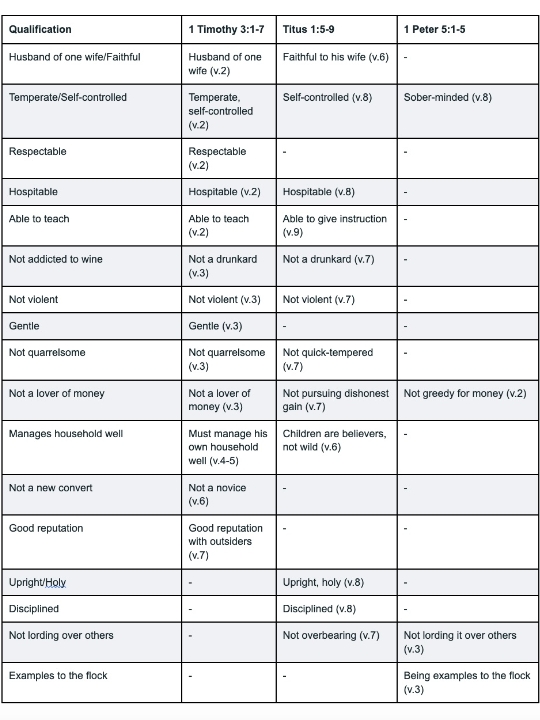
Should Pastors Be ‘Restored To Ministry’?
It has become commonplace to hear of a pastor, whether they are a New York Times bestseller or the one down the street, falling into sin and that sin being brought to light. Usually, these stories follow the same basic pattern: the sin is discovered, the pastor makes a public statement in which he apologizes and repents, before being eventually restored and brought back into the position he previously held. Such is the case with many of the recent controversies and scandals that have surrounded Robert Morris, Tony Evans, T.D. Jakes, Perry Noble, Mark Driscoll, and unfortunately numerous others. Whether it involves sexual sin (Morris), alcohol abuse (Noble), self-control, (Driscoll), or some ambiguous unnamed sin (Evans) - it has all become so commonplace we don’t even question when this happens. Almost never does anyone ask, “Should restoration back into pastoral ministry even take place?” After all, we are taught that grace, mercy, love, and forgiveness should play a part in all we do, so it seems unloving to query another believer’s restoration.
But is that really what we would be doing? You see, there are two different potential kinds of restoration in play here, particularly when it pertains to pastors: We could be speaking of restoration back into fellowship with the church community (Galatians 6:1; James 5:19-20; 1 Corinthians 5:1-5) or we could be speaking of restoration back into a pastoral position.
This is where we often go wrong. While we have plenty of scriptures that both instruct and urge us to restore repentant believers back into community we have none that speak of restoring pastors that have fallen into sin back into their position of authority. We actually have the exact opposite: a list of qualifications for those who aspire to the office of pastor. These qualifications set the bar for those that will lead Christ’s Church.
For those unfamiliar with these qualifications a quick read-through of 1 Timothy 3:1-7, Titus 1:5-9, and 1 Peter 5:1-5 will give you a basic overview of what they are. Many of those mentioned in these verses are identical across all three passages and where qualifications are unique you can see a general connection in the others. These qualifications are there to ensure that Christ’s Church is led by men that will be faithful and lead well.
So what is a local church to do if a pastor becomes disqualified by sinning in a way that means he no longer can hold the office of elder? Whilst I fully agree with the idea of being restored to the body, for many this is only the first step before going on to restore them to their pastoral position. I do not consider this to be Biblical.
Before giving my reasoning, allow me to address the common rebuttals to my position. There are three primary biblical examples of sin and repentance that people point to when seeking to restore a pastor to ministry.
Firstly King David, his sin with Bathsheba, his repentance and his subsequent restoration. to God, and his restoration as a result (See 2 Sam 11-12, Psalm 32 for details). The question we have to ask here is: does David have an office like that of a pastor or is this repentance and restoration what we would expect of anyone that follows God? David is acting as a ruler of a people, akin to a President or Prime Minister repenting and being restored. Even in this case restoration doesn’t come without consequence: the child that is born from this sin will die (2 Samuel 12:14-18) and David is put to shame (2 Samuel 12:10). While it is true that the Lord shows David mercy (2 Samuel 12:13) the results that come from this sin follow him the rest of his life.
The second example is that of Peter after his denial of Christ. In John 21:15-19 we see Jesus asking Peter if he loves Him three times after each time telling him to do something as a result of his love for Him; to firstly “feed my lambs”, then “tend my sheep”, and lastly “feed my sheep”. Jesus then finishes the conversation by telling Peter how he would die for the glory of God. This does not, however, appear to be a restoration back into ministry, but rather a new call into a new ministry which he did not previously walk in.
Finally, some point to a later interaction with Peter and Paul, where Peter clearly acts hypocritically, and thus his repentance after Paul confronts him can be seen as the same as a pastor repenting after being called out for sin (Gal 2:11-14). So if Peter was still qualified for ministry after this interaction then surely a pastor now would be qualified for ministry after repentance as well, right?
The context of the verse helps us here: so far in this epistle, Paul has called out the Galatians for turning to a “different gospel” (Galatians 1:6-10), and spoken of meeting with the Apostles in Jerusalem to affirm the Gospel he preaches, as well as his ministry to the Gentiles (Galatians 2:1-10). As such, Paul reminds them of this incident in order to demonstrate that Peter’s behavior functionally compelled Gentiles to live like Jews, and Jews to live as if the law could justify them; the very point Paul wanted to refute. While it is clear that Peter was in the wrong in this situation, it does not demonstrate that Peter sinned in a disqualifying way and could be reinstated.
So what do we mean by a “disqualifying sin”? I’ve included a side-by-side comparison of the lists of the qualifications found in 1 Timothy 3:1-7, Titus 1:5-9, and 1 Peter 5:1-5 at the bottom of this article for reference, but let me summarize them: an elder must be above reproach, maritaly faithful, self-controlled, respectable, hospitable, able to teach, not a drunkard, not violent, gentle, not quarrelsome, not a lover of money, manage his household well, not be a new convert, have a good reputation, be holy, be disciplined, not lord over others, and be an example to the flock.
By definition, if one is qualified by meeting these standards, then by either not meeting them or sinning in such a way that you no longer continue to meet them disqualifies you. . If a man is not faithful to his wife, or proves himself to be greedy, or is undisciplined, or can’t teach scripture, or is found to not be above reproach, he becomes disqualified.
But what if a pastor, after failing to meet such qualifications, repents and is found to meet them thereafter? Well, Paul demonstrates the answer across many of his epistles. In Titus 2:7-8 Paul writes to Titus and tells him to be an example of what is good, and to show integrity in his teaching as well as soundness in his speech so that he cannot be condemned. Likewise in when Paul writes to the Romans, specifically addressing the Jews, he states that the way they have lived among the Gentiles has caused the Gentiles to blaspheme God and not take him seriously (Romans 2:24). Still yet in Philippians Paul instructs believers to live in blameless ways, not grumbling or arguing so that they stand out from the crooked generation they live in. In doing so they will be seen as different and Christ will be honored (Philippians 2:14-15). Though many of these are written generally to believers and not specifically to elders, it shows an overall point: actions matter.
If pastors are to be those that live as an example for other believers to aim for (2 Peter 5:3; 1 Corinthians 11:1) then those within those positions, while not sinless, must be examples worthy to be held in honor (1 Timothy 5:17). Pastors should demonstrate humility, faithfulness, devotion, speech, and self-control. While pastors, like all believers, will fail to live sinless lives until Christ’s return, the scripture is clear that teachers will be judged more harshly (James 3:1). Of course, failure to uphold these standards within the office of elder after the qualifications have been made so clear, doesn’t disqualify one from being restoration to the body after repentance. But it does seem to call into question the idea of restoration to the office after they have proved to not be able to live in a manner worthy of the call.
To put a man back into the position of pastor after disqualifying himself is to lower the authority of the office. It would be similar to putting a police officer that had purposefully broken the law back on the force; it’s irresponsible for no other reason than he has already proven himself to be unqualified for the job.

